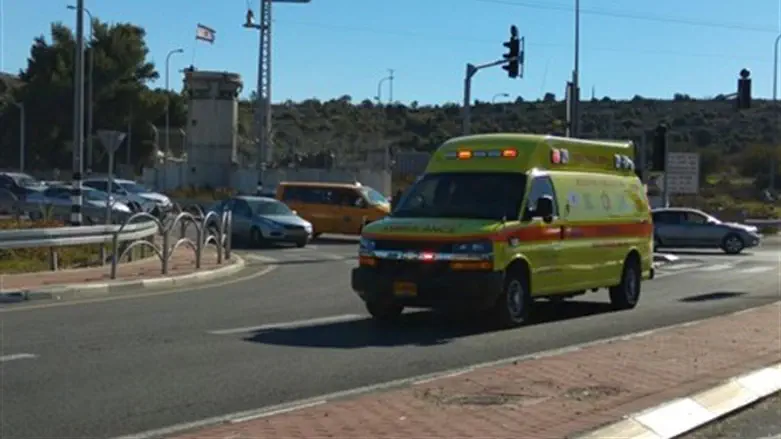
After Miri Shvimmer, a United Hatzalah volunteer paramedic responded to three life-saving calls in a few hours with Lior Ashkenazi, a fellow United Hatzalah volunteer EMT, she quipped “One might say we had a productive day.”
On Friday afternoon just after 3:00 p.m. the couple responded to an emergency in which an individual jumped off the Kibbutz Galuyot bridge. The patient suffered severe trauma to multiple systems and was treated on scene by the couple who were among the first responders to arrive at the scene. “We were out shopping and we got the call that a person had fallen from the bridge. Due to the traffic jams that ensued, it took the ambulance a long time to arrive. We drove on Lior’s ambucyle and arrived in just a few minutes,” explained Shvimmer.
The couple, who had treated a teenager for serious stab wounds just two days earlier, was on the scene of the attempted suicide within less than three minutes, thanks to Ashkenazi’s ambucycle.
“We arrived at the scene together but left separately,” explained Ashkenazi as Shvimmer, who is a paramedic, had to head to the hospital with the ambulance as the vehicle that arrived at the scene did not have a paramedic on board.
“In Israel, it is against the law to diminish care,” explained Eli Beer, President, and Founder of United Hatzalah. “Thus if the medical situation requires a higher level of care and one of our volunteer paramedics or even one of our volunteer EMTs are more experienced than the ambulance crew, they go with the ambulance and transport the patient to the hospital. This is in order to maintain the high level of care that our volunteers provide for the patients during the journey to the hospital as well.”
Before Shvimmer left with the patient, Ashkenazi asked which hospital the ambulance was headed to and cleared the way on his ambucycle. He met Shvimmer there and picked her up so that the couple could continue their afternoon, having saved the person’s life and handed the patient over to the next level of care at the hospital. “We headed back to the shuk (open market) to finish our shopping for Shabbat and we had just arrived when we received a call that a woman had collapsed one street over. We rushed over and began CPR,” Ashkenazi recalled. Once again the couple was the first on the scene. “Unfortunately in this instance the patient did not survive and after lengthy resuscitative efforts EMS teams were forced to declare her death.”
The CPR call was the third call of the day for the pair. “We were a bit busy all day,” said Ashkenazi. “We had responded to an allergic reaction earlier in the day when Miri had to accompany an ambulance once again to the hospital after a child suffered an anaphylactic reaction in the morning and required an epinephrine shot. We both went to the emergency and I picked her up then as well.”
Both Shvimmer and Ashkenazi agree that “It isn’t always simple to have to drop everything at a moment’s notice and keep up with all of life’s expectations of studying, errands, and still having a social life. But the goal and the reward of helping others makes it well worth the hassle and keeps us motivated. We have found that we are able to minimize the effects on our schedules of rushing to a scene as much as possible even when it happens multiple times a day. Thankfully, our friends and family are all very understanding of our spontaneous disappearances due to an emergency call in our vicinity, and that makes it easier for us as well.”